You are here
New Releases
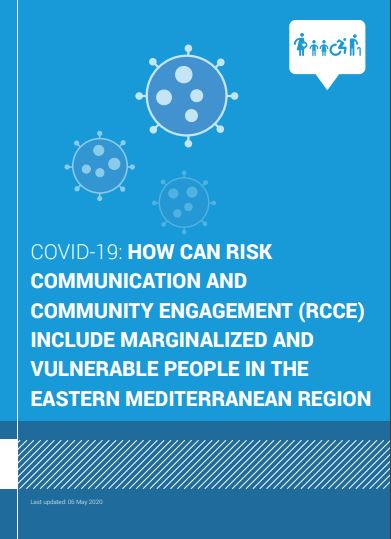
COVID-19: How Can Risk Communication and Community Engagement (RCCE) Include Marginalized and Vulnerable People in the Eastern Mediterranean Region
Some segments of our societies, particularly women, internally- displaced people, migrants, refugees, the elderly and people with disability are among those who may experience the highest degree of marginalization. People who experience marginalization, particularly those
facing intersecting forms of discrimination across diverse factors - including gender, age, disability, migrant or refugee status, nationality, ethnicity, health conditions, geography and socioeconomic status - become even more vulnerable in emergencies.1 This is due to many factors such as their lack of access to effective surveillance and early-warning systems and health services.
The COVID-19 outbreak is predicted to have significant impacts on various sectors. Among the vulnerable groups outlined below, the people most at risk of experiencing the greatest health, social and economic impacts are those who:
Depend heavily on the informal economy;
Live in areas prone to conflict and in humanitarian settings;
Have inadequate access to social and economic services, community support or political influence;
Have limited capacities and opportunities to cope and recover;
Have limited or no access to technologies and public infrastructures;
Live in camps, informal settlement settings or densely-populated areas or housing units;
Live in host communities without formal residency permits;
Are in prisons or detention centers;
Fully depend on protection services and unpaid care work;
Are already subject to discrimination and violence;
Survivors of gender-based violence.
By understanding these issues, and how they impact women, men, boys and girls of diverse ages, backgrounds and physical abilities, we can support them better in emergencies by prioritizing their needs and engage them in decision- making processes for preparedness, response, recovery and risk reduction.
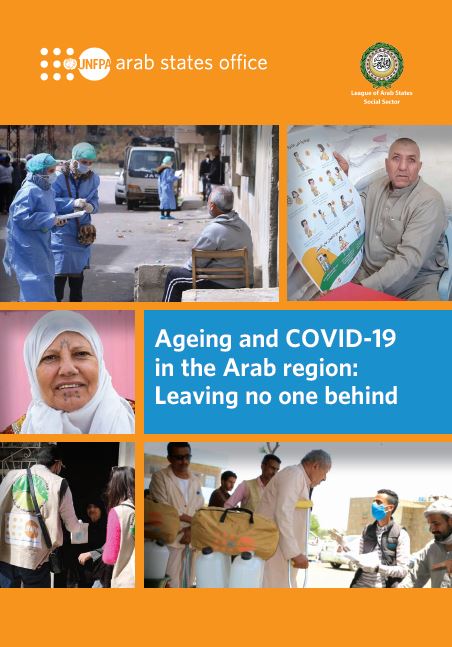
Ageing and COVID-19 in the Arab region: Leaving no one behind
Older persons are the most vulnerable to COVID-19 and therefore more likely to require hospitalization when infected. Ageing is commonly associated with morbidities such as hypertension and diabetes, making older people more susceptible to hospitalization and death. In resource-poor settings, limited health care facilities and the lack of ventilators and oxygen supply can significantly add to death rates among older persons with COVID-19. The COVID-19 mortality rate varies across regions and is determined by a range of factors. Of these, the most notable are: demographic profile, population age structure, number of persons tested and cases detected, health system capacity, accuracy of reporting of COVID-19 deaths, plus compliance in implementing WHO guidance for prevention against transmission
of the disease (e.g. physical distancing,isolation of infected people and frequent sanitizing).
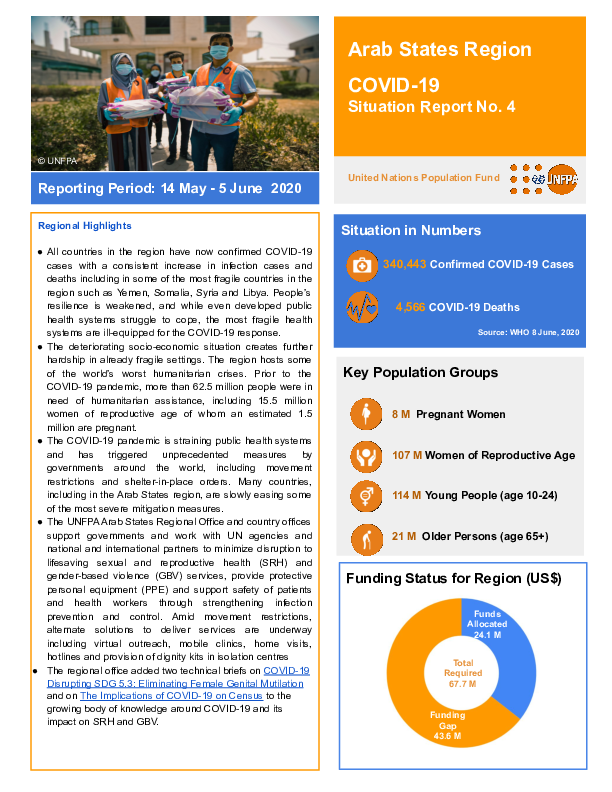
COVID-19 Situation Report No. 4 for UNFPA Arab States
Regional Highlights
All countries in the region have now confirmed COVID-19 cases with a consistent increase in infection cases and deaths including in some of the most fragile countries in the region such as Yemen, Somalia, Syria and Libya. People’s resilience is weakened, and while even developed public health systems struggle to cope, the most fragile health systems are ill-equipped for the COVID-19 response.
The deteriorating socio-economic situation creates further hardship in already fragile settings. The region hosts some of the world’s worst humanitarian crises. Prior to the COVID-19 pandemic, more than 62.5 million people were in need of humanitarian assistance, including 15.5 million women of reproductive age of whom an estimated 1.5 million are pregnant.
The COVID-19 pandemic is straining public health systems and has triggered unprecedented measures by governments around the world, including movement restrictions and shelter-in-place orders. Many countries, including in the Arab States region, are slowly easing some of the most severe mitigation measures.
The UNFPA Arab States Regional Office and country offices support governments and work with UN agencies and national and international partners to minimize disruption to lifesaving sexual and reproductive health (SRH) and gender-based violence (GBV) services, provide protective personal equipment (PPE) and support safety of patients and health workers through strengthening infection prevention and control. Amid movement restrictions, alternate solutions to deliver services are underway including virtual outreach, mobile clinics, home visits, hotlines and provision of dignity kits in isolation centres
The regional office added two technical briefs on COVID-19 Disrupting SDG 5.3: Eliminating Female Genital Mutilation and on The Implications of COVID-19 on Census to the growing body of knowledge around COVID-19 and its impact on SRH and GBV."
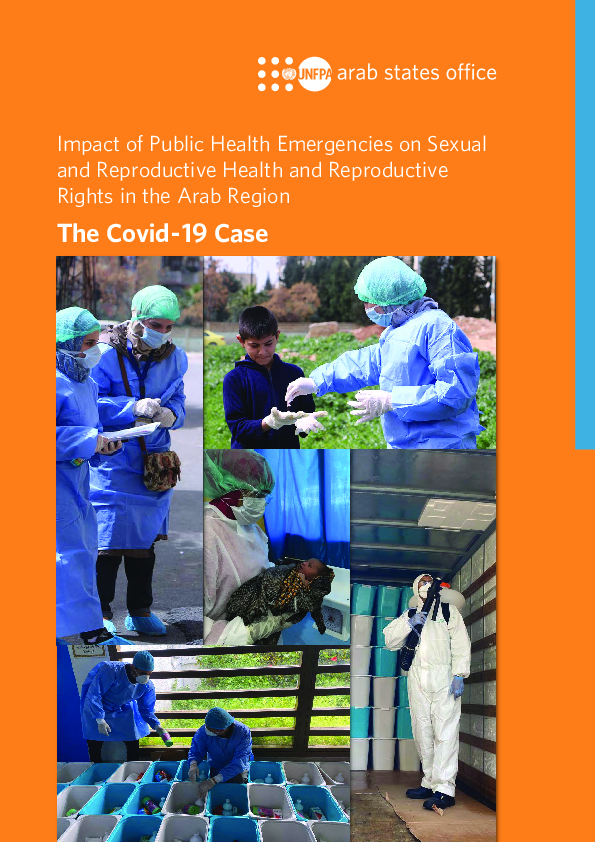
Impact of Public Health Emergencies on Sexual and Reproductive Health and Reproductive Rights in the Arab Region
In the last decade the world has experienced many public health emergencies, similar to the current novel COVID19 pandemic (e.g. Ebola, MERS, Cholera, Polio and Zika epidemics). Demand on health care services continued during health emergencies including general health care such as Non-Communicable Diseases (NCDs), mental health services, immunization programs, as well as SRH services such as family planning (FP) and maternal health (MH)1,2. Although often overlooked, SRH is essential for sustainable development and women’s empowerment3. SRH is a basic human right, which has been captured in many international agreements such as the Programme of Action of the International Conference on Population and Development (ICPDPoA), the Sustainable Development Goals (SDGs), especially goal 3 on health and goal 5 on gender equality, as well as the commitments made during the World Humanitarian Summit (2016), to name a few. While these international conventions and treaties have been ratified by almost all countries and have called for giving more importance to reproductive health during crises, SRH is still not well prioritized at the level of other needs such as food, water, sanitation and hygiene (WASH), or shelter.
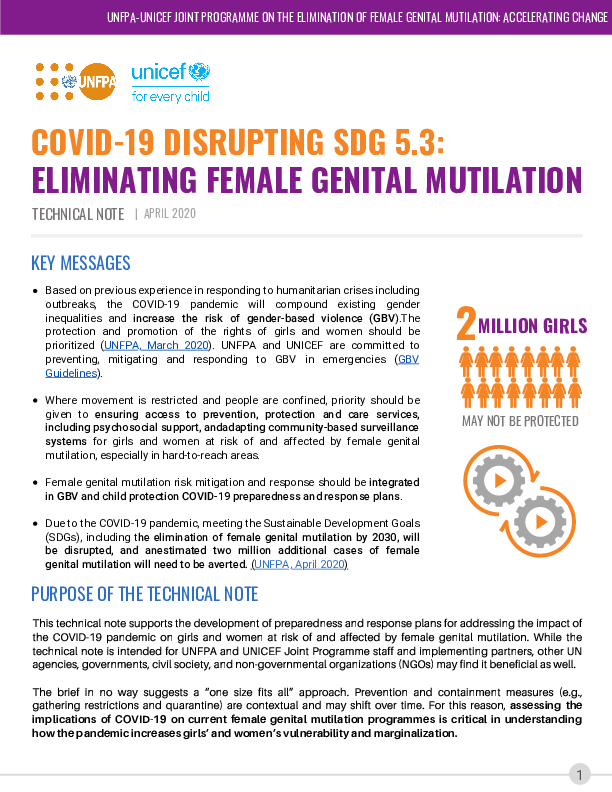
COVID-19 DISRUPTING SDG 5.3: ELIMINATING FEMALE GENITAL MUTILATION
This technical note supports the development of preparedness and response plans for addressing the impact of the COVID-19 pandemic on girls and women at risk of and affected by female genital mutilation. While the technical note is intended for UNFPA and UNICEF Joint Programme staff and implementing partners, other UN agencies, governments, civil society, and non-governmental organizations (NGOs) may find it beneficial as well. The brief in no way suggests a “one size fits all” approach. Prevention and containment measures (e.g., gathering restrictions and quarantine) are contextual and may shift over time. For this reason, assessing the implications of COVID-19 on current female genital mutilation programmes is critical in understanding how the pandemic increases girls’ and women’s vulnerability and marginalization.
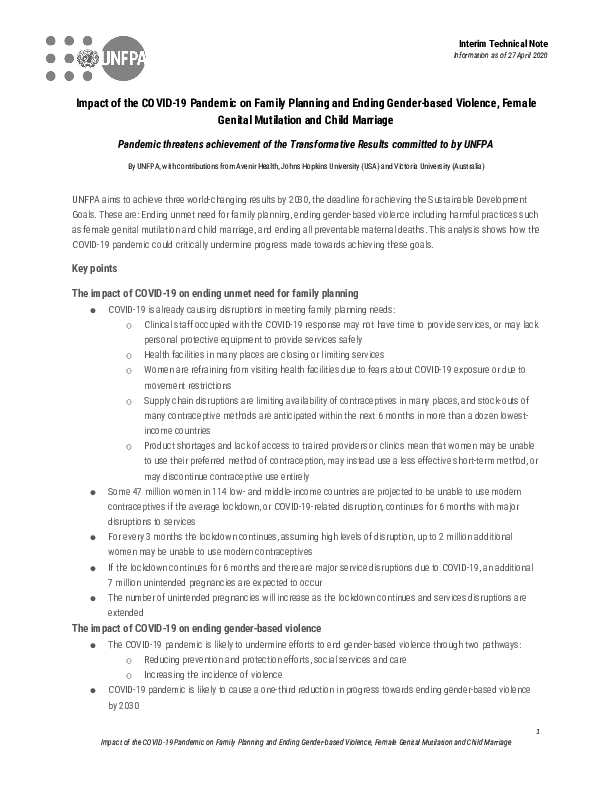
Impact of the COVID-19 Pandemic on Family Planning and Ending Gender-based Violence, Female Genital Mutilation and Child Marriage
UNFPA aims to achieve three world-changing results by 2030, the deadline for achieving the Sustainable Development Goals. These are: Ending unmet need for family planning, ending gender-based violence including harmful practices such as female genital mutilation and child marriage, and ending all preventable maternal deaths. COVID-19 pandemic could critically undermine progress made towards achieving these goals.
COVID-19 Situation Report No. 3 for UNFPA Arab States
The region hosts some of the world’s worst humanitarian crises. Prior to the COVID-19 pandemic, more than 62.5 million people were in need of humanitarian assistance, including 15.5 million women of reproductive age of whom an estimated 1.5 million are pregnant.
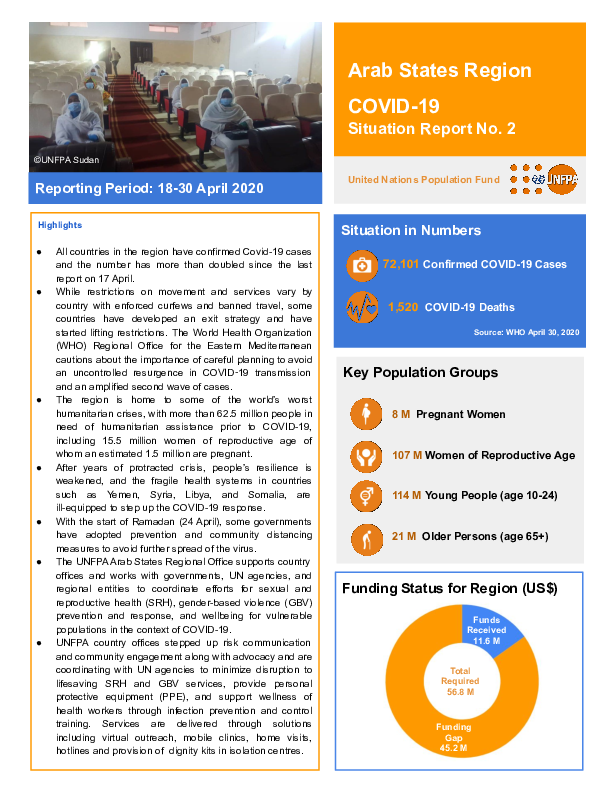
COVID-19 Situation Report No. 2 for UNFPA Arab States
"At regional level, UNFPA participates in the WHO regional crisis management group and sub-working groups (risk communication and community engagement; humanitarian settings and displaced population) and co-chairs the regional inter-agency gender theme group and its GBV Covid-19 sub-working group, ensuring integration of GBV within health. Country offices are working closely with other UN agencies, governments, and other partners for the continuation of services and safeguard gains in SRH and GBV. UNFPA is engaged through the UN Country Team coordination mechanisms and supports the respective national Covid-19 Preparedness and Response Plans. These ensure prioritization of SRH and GBV concerns and to look beyond the immediate impacts of the pandemic."
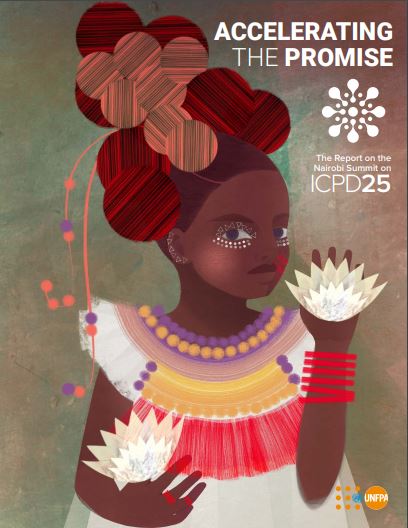
Nairobi Summit on ICPD25 Report
This report captures the unique essence, substance and outcomes of the Nairobi Summit on ICPD25: Accelerating the Promise, co-convened by the governments of Kenya, Denmark and UNFPA on 12-14 November, 2019.
It is launched at a particularly challenging time for sexual and reproductive health and rights worldwide. As countries around the world grapple with the COVID-19 pandemic, we see just how critical the issues highlighted at the Summit are.
Six months after the Summit, countries are already taking steps to make good on their Nairobi commitments. We see increasing calls to prioritize the rights, health and safety of women and girls, including the recent joint ministerial statement on behalf of 59 countries calling for the protection of sexual and reproductive health and rights and promoting gender-responsiveness in the COVID-19 crisis.
For instance, Sudan’s recent ban on female genital mutilation and Kenya's Nairobi commitment to end the practice mark a huge step forward on eliminating this harmful practice for women and girls.
The Nairobi Summit set a clear direction for the path ahead, and our forward march continues. It’s time to finally deliver concrete results for women and girls, and ensure that no one is left behind in the final push to 2030 and achieving the Sustainable Development Goals.
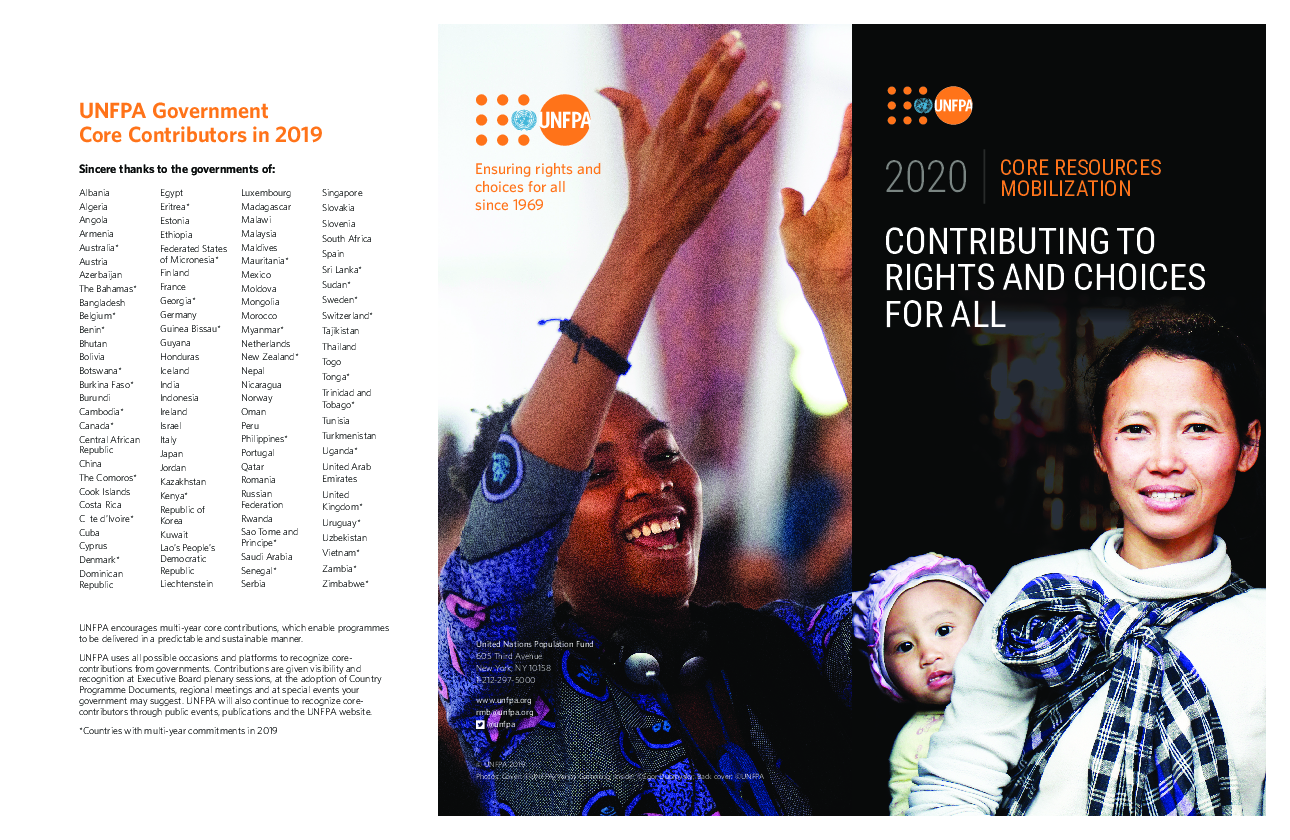
UNFPA 2020 Core Resources Mobilization
The three transformative results set out in UNFPA’s Strategic Plan 2018-21 in support of the realization of the 2030 Agenda for Sustainable Development cannot be achieved without securing adequate level of core resources, intensifying programmatic approaches, maintaining a global presence, and mobilizing additional resources to scale up results.
Every year, UNFPA appreciates the core mobilized support from Governments to pursue the organization's Vision 2030 and transformative results: zero unmet need for family planning; zero preventable maternal deaths; and zero harmful practices and gender-based violence.
Core resources are the foundation for all UNFPA programmes which aim to leave no one behind. UNFPA’s objective in 2020 is to rally a diverse coalition of contributors around our shared mandate: “Ensuring Rights and Choices for All”. We aim at mobilizing at least 150 governments globally towards this effort .